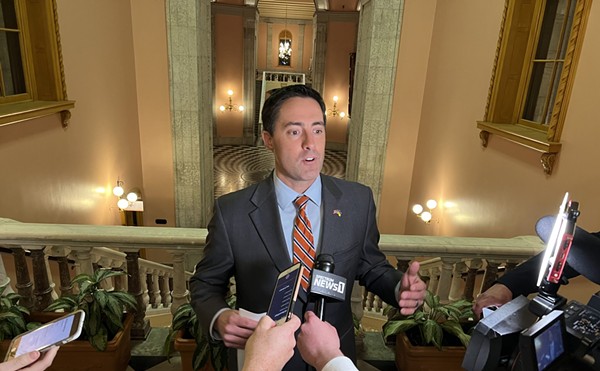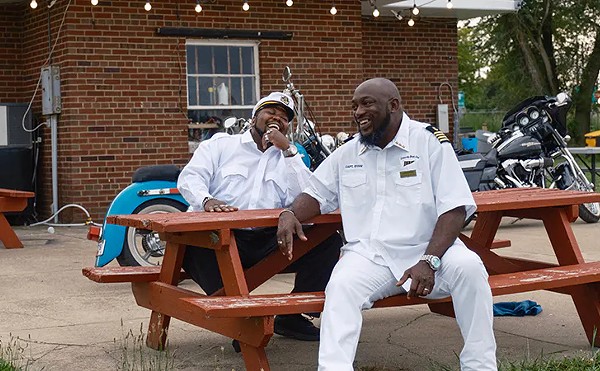He terrorizes employees. Turns a negotiation over a festival permit into a power play. Doesn't return a councilman's phone calls. Doesn't even pretend to care.
This is what people say about Nick Jackson.
They whisper this in secret, of course, when no microphones or notebooks are near. People don't want to go public with their disdain for the mayor's brother. But in private, they have plenty to say.
Once, he blew up at a meeting about a construction project that was behind schedule. Never mind that he hadn't shown his face onsite for six months; he still insisted that he knew best. "I have a good job and a pretty wife, and I don't intend to lose either one of them," he barked. "Whoever fucked up this job better unfuck it."
At City Hall, he was so hated that a lawyer's investigation turned up piles of dirt dished by high-ranking officials. "Foul-mouthed and unprofessional," they called him. "Aggressive." "Demeaning." The kind of guy who thinks it's funny to joke about sex with an employee who was up all night with her newborn daughter.
Of course, such behavior isn't really a sin in Cleveland, where we've never subscribed to the Martha Stewart school of etiquette. And his personality would be irrelevant if he were doing a good job. Unfortunately, the words "Nick Jackson" and "good job" are rarely used in the same sentence.
When Cleveland's new schools chief, Eugene Sanders, arrived this summer, he wasted no time clearing the decks. By late August, nearly everyone in the top brass had disappeared. A new chief of staff, new chief operating officer, new construction boss, new academic officer -- all were imported from Toledo, Sanders' last post.
It was a welcome purge, in light of the district's track record. Sanders' predecessor, Barbara Byrd-Bennett, was the latest in a long line of tragic heroes who rode into town as saviors, then quickly fell on their swords in the face of the schools' insurmountable misery.
Byrd-Bennett enjoyed the highest salary of any government employee in the state, but seemed to squander the money destined for others. At her prodding, taxpayers coughed up $335 million for a massive construction project, then watched, slack-jawed, as the money disappeared into the abyss. Today, only a handful of new schools are finished, and at least three of them opened late.
No one's quite sure where all the money went. District officials can't seem to provide a straight answer.
Other highlights of Byrd-Bennett's tenure included make-believe attendance figures, phantom bus riders, and massive teacher layoffs. By her eighth and final year, the district had once again failed to meet any state academic standard, going 0 for 25. The schools were performing just as poorly as when she arrived.
So no one was surprised when Sanders lopped the heads off many of the district's administrators. But strangely enough, one of the few ranking officials to survive was Nick Jackson.
The Jackson brothers form a uniquely Cleveland dynasty. Their story has the heart-tugging ingredients of a Lifetime special.
Father George was a factory worker, mother Rose an Italian immigrant who stayed home to raise five kids.
Frank went straight from high school to war, serving in Vietnam at an Army warehouse. He returned to Cleveland and a factory job, followed by the obligatory stint on the streets. As Frank tells it, he went to college to teach the smart-ass white kids a lesson. They thought they knew something about his life and his color. He got a law degree to prove them wrong.
His political ascent was slow and maddeningly unremarkable. No glaring headlines or significant proposals. He kept his voice low and cut deals behind the scenes. It took him 16 years to reach the city's highest office. Even now, he's known as the Invisible Mayor. His power stems not from charisma, but from his gift for revenge.
"Everybody's afraid of the Jacksons," says Judy Zamlen-Spotts, a former city employee who worked in special events under ex-Mayor Mike White. "People are intimidated by them. They have long memories, and they're unforgiving."
Shorter than his big brother and a decade younger, Nick was never slick enough to be a politician. With his gruff eyes and mafioso jowls, he looks more hit man than statesman.
He graduated from the vocational school at Max Hayes High in 1974 and toyed with a few classes at Tri-C, but never graduated. As he tells it, his first job was as a stock person for American Greetings. He was doing engineering work for the company when its manufacturing arm moved to Kentucky. Rather than leave town, Jackson applied for a city job.
The bottom rung of the Water Department isn't where brain surgery is performed. Jackson was hired as a junior draftsman in 1985, four years before his brother won a seat on city council. He climbed a fairly traditional ladder, rising from construction inspector to manager of a water-plant rehab project, then supervisor of pipe-repair crews. By then, his brother was a councilman. That's when Nick's career took off.
He won higher rank in the Water Department --a promotion to assistant commissioner in the distribution section -- around 1992, during Frank's first term on council.
Over the next five years, Nick must have impressed someone in Mayor Mike White's office. In 1997, he became assistant director of public utilities -- a job that gave him authority over water, pollution control, Cleveland Public Power, and the division of fiscal control. He was now supervising nearly 2,000 employees and overseeing a $200 million budget. But the younger Jackson barely had a chance to get his hands dirty. Within a few months, White tapped him to become director of Parks and Recreation.
Until then, Jackson had enjoyed the benefits of nepotism available to most relatives of public figures in Cuyahoga County. Recorder Patrick O'Malley and Auditor Frank Russo are famous for stocking their payrolls with the sons and daughters of political comrades. Prosecutor Bill Mason hired his niece to handle PR.
One could argue that Jackson earned his bones more than other relatives did, working his way up at the Water Department while Councilman Frank was new to the political scene. But his rise to City Hall's upper strata is harder to explain. After all, his work history doesn't exactly scream "promotion."
While Jackson was assistant water commissioner, he was supposed to oversee the department's off-site warehouse, known as Harvard Yard. But under his watch, employees were running their own Turkish bazaar. They raked in cars, World Series tickets, and other kickbacks while allowing vendors to jack up prices. The department ended up spending more than $1.1 million on overpriced materials and supplies.
Two Harvard Yard employees went to prison for the scheme, and a third is still on probation. One of the imprisoned claims in court documents that his superiors were aware of the corruption and created a work environment that encouraged it. The FBI investigation is still open. But so far, Jackson and his downtown superiors have escaped untarnished.
They pleaded ignorance. "Me, him, and a number of people got taken on that one," says Julius Ciaccia, the public utilities director and Jackson's boss at the time.
But even if you buy that argument, it doesn't bode well for Jackson's management skills.
After all, he has no training to be an administrator. By his own testimony, his only post-high school education is an associate's degree in industrial engineering, industrial management, and quality assurance. And even that claim is suspect. He says he graduated from a small school called the Applied Technology Institute in 1985 or 1986 -- the same year he started working for the city.
But Scene could find no school in Cleveland by that name. The only Applied Technology Institute in the country is based in Maryland, and it doesn't grant diplomas. It provides short seminars and correspondence courses on "space, communications, defense, sonar, radar, and signal processing." Not industrial engineering. More important, the institute has no record of a student named Nicholas Jackson. (Jackson did not respond to repeated interview requests.)
White apparently didn't mind. He was known for promoting people with little formal education. If they were bright, he trusted them to learn on the job. Besides, he didn't have much choice: His mercurial style drove away so many employees that the quality of applicants decreased by the year.
No matter. To White, the most important qualification was blind loyalty -- the one trait Jackson displayed in abundance. Even as the FBI accused White of running an extortion ring out of City Hall, Jackson defended him.
"I'm not a very smart person, but I'm not stupid," he once told a school district lawyer. "Part of my loyalty to the mayor is to make sure that the things I do that he asks me to . . . that we do it within the confines of the law. And we do it so it doesn't come back to hurt him."
So Nick got to run Parks, Recreation and Properties, one of the biggest departments in the city. He oversaw everything from cemeteries to the West Side Market, the convention center, and Browns Stadium. For two glorious years, this was his fiefdom. He even got a promotion. By White's last year, he had become the mayor's executive assistant in charge of parks, recreation, public service, and utilities. It was an enormous job. And by most accounts, Jackson was a disaster.
"Nick Jackson is one of the hardest-working people I've ever met. There isn't anything he wouldn't learn. He's open. He's intelligent. He's a scrapper. He's a fighter. He's aware of things . . . I would have confidence, if he was on a project, that it would get done right."
This praise comes from former employee Judy Zamlen-Spotts, who worked for him in the city's special-events department. She believes that Jackson was "the best director of parks we'll ever have." He was loyal to his staffers, she says, protecting them from White's notorious wrath. He rewarded cleaning crews with special praise and more than pulled his weight as a "24-hour boss."
But Zamlen-Spotts is nearly alone in her enthusiasm for Jackson. At City Hall, it seemed as if only she, Ciaccia, and White professed such confidence. An independent report, based on more than a dozen interviews, paints an entirely different picture.
When White left office in 2001, he took care of his most loyal servants. Jackson and six other city employees were handed school jobs. Jackson walked away with one of the sweetest deals: $102,000 a year to serve as Byrd-Bennett's chief advisor on the massive, $1.5 billion project to rebuild Cleveland's schools.
But before he could even get started, scandal struck. Councilman Mike Polensek accused Jackson of going behind city council's back to strike a deal that would let the convention bureau buy $216,000 worth of equipment for the city, instead of repaying a loan. It was a bureaucratic sin -- by law, council is supposed to approve all purchases worth more than $10,000. And with bribes changing hands throughout the White administration, the secret nature of the proposal raised suspicion.
Byrd-Bennett made a big show of checking out the allegations, hiring an attorney from Ulmer & Berne to investigate. She probably expected a typical Cleveland investigation: cursory interviews, a mountain of billable hours, and a clean bill of health. What she couldn't have predicted was that the lawyer, Inajo Chappell, would actually do the job. The result was a brutally candid indictment of Jackson.
Chappell interviewed at least five high-ranking city employees, along with a private construction manager, architects, two members of the convention bureau's board of directors, and a leader of the West Side Market Tenants Association. In the end, she cautioned that much of the dirt heaped on Jackson might have been motivated by racial or political strife. Nevertheless, her conclusions were damning.
Take, for example, Jackson's management of the West Side Market renovation. As White's executive assistant, he was the mayor's point man on the project, though he had no construction experience beyond rehabbing a water plant.
First, there were delays in the renovation of the market's produce section. No one expected a government project to finish on schedule, but vendors were upset when they were left hawking their wares in a freezing tent as winter set in and their customers disappeared. As public outcry grew, Jackson felt the heat. He hadn't shown his face at construction meetings for six months. But that winter, just after Christmas, he ordered the construction manager to "unfuck" his problem.
There was more grief to come. Inside the market, the new refrigerated cases began to rust soon after they arrived. They also had drainage problems and tended to overheat. Rather than put up with the mess, the city stopped installing the cases and sued the architect and the company that made them.
In the end, the project ran more than $1 million over budget. Five years later, it's still not finished. The city won its suit -- and enough money to buy new refrigeration cases. But nothing has happened. A third of the vendors are still using their 50-year-old units, and the rest are waiting for their faulty cases to be replaced.
"We're still in flux here," says Lucille Walker, president of the tenants association.
Tony Pinzone and Ed Meister, who were tenant board members when the project started, say that Jackson isn't to blame. He was just a victim of a shoddy contractor, as they all were. "They didn't really get what they paid for," Meister says.
Such charitable analysis ignores the fact that Jackson and his cohorts were supposed to be supervising the contractors. And as city staffers produced mountains of memos warning of trouble to come, Jackson failed to answer them.
"Allegations abound by city employees that the project was administered poorly and that safety issues flagged by staff were ignored or disregarded," Chappell wrote. "The most common complaint against Jackson is that he was non-responsive to requests for project direction and that he provided poor or little oversight on the project."
In other words: The general had sent his troops into battle, then failed to lead them. And it got worse.
Both Kurt Wiebusch, the city's commissioner of architecture, and Craig Kertesz, the construction manager hired for the job, said that Jackson possessed the dread combination of "authority without competence."
"He had made statements -- and probably made decisions -- that were not based on an in-depth knowledge of the construction process," Kertesz carefully explains, as if searching for a polite way to define "dumbass." "He was not knowledgeable about those, yet he was in a position of authority."
It was this authority -- not to mention the $110,000 salary it entailed -- that riled Jackson's colleagues, and they were quick to jump on any perceived misstep.
Monica Wells, another special-events employee, accused Jackson of sexual harassment after he suggested that she was up all night having sex, rather than tending to her newborn baby. It was a comment that might slide as a joke between friends. But it came from a supervisor, and Wells is still incensed eight years later.
"As a woman, you gotta stand your ground," she says. "I didn't appreciate the gesture . . . I think he was just somebody that was just put in a position because of who he knew."
Nearly every employee Chappell interviewed described Jackson as "foul-mouthed and unprofessional," "aggressive," and "demeaning." They also believed that he viewed himself as above the law.
"Throughout the investigation we were told that Jackson showed a complete disregard for rules and regulations," Chappell wrote. He proposed the convention-center equipment deal without council approval, and did the same when securing funding for a renovation of the Miles Standish school playground. On other projects, he ran over budget -- $600,000 on the Highland Park Cemetery expansion -- or stalled them unnecessarily, as with a months-long delay in buying new playground equipment for Lincoln Park in Tremont.
Most of the time, Jackson was simply following White's orders. The mayor used neighborhood projects as if he were a medieval monarch, to reward the faithful and punish his enemies. But when Jackson took his act to the school district, he no longer had the mayor to blame.
Jackson was hired a few months after the school district's massive construction project began. With so much work to be done, it was easy to create a new position for him as Byrd-Bennett's advisor on the project.
At the time, district officials insisted that Jackson and the other new hires were recruited for their stellar résumés. But Jackson's job application spoke for itself. It called for three references not related to the applicant. But his brother's name was at the top of the list.
By then, Frank had been elected city council president, which meant that Nick was virtually untouchable. His new gig at the schools set off panic attacks among former city colleagues. They worried that he would repeat his train-wreck performance. Except this time, he would derail the largest school-construction project in the state.
"Nearly every city employee interviewed expressed concern about Jackson's ability to perform his job with the District," Chappell wrote in her report. "There is a very real sense among many of those interviewed that Jackson should not be administering or managing any construction or facilities program."
Even the mild-mannered Plain Dealer was outraged by Chappell's report. The editors called on Byrd-Bennett to fire Jackson. "Is she so deaf to the political ramifications of a hire that smacks of pure patronage?" they wrote.
But Jackson survived without so much as a slap. And sure enough, he soon lived up to his reputation.
Jackson was supposed to help the state come up with a master plan for the project, make sure the district complied with all rules, and be the liaison to the public oversight board. In essence, his job was to ease tensions between the public, politicians, and state officials, who had all grown to distrust the district.
One of his primary duties was to relay information about the project to the bond-accountability commission. This panel was established to assure voters that their money would not be wasted, as it had been so many times before.
Yet observers say that Jackson never seemed able to answer the panel's questions. It wasn't just a matter of deferring to a deputy for some paperwork; he was clueless.
"Nick Jackson did not demonstrate . . . the kind of competence that was necessary," says Jim Lardie, a schools watchdog and head of the advocacy group For the Children. "Somebody's supposed to be in charge because they know what's going on, and he clearly didn't."
Panel members found themselves fighting to get information. Nor was Jackson returning calls from council members.
"He wasn't calling me back," says Councilman Zachary Reed, who hounded Jackson for months with complaints about two schools in his Mt. Pleasant neighborhood. It took a bombardment of weekly calls to get Jackson's attention.
"He just finally came to the realization, 'I got to get this problem off of my plate,'" Reed says.
During Jackson's tenure, the bond commission -- the tool that was supposed to gain the public's trust -- fell apart. In four years, it produced two vague reports and one "report card" that failed to mention how much money had been spent. By the time it shut down in 2005, barely anyone noticed. School board members admitted that they didn't even know where all the construction funds went.
Meanwhile, construction fell behind. And in the case of John Hay High School, it ran millions over budget. Parents and city council members complained that the renovation arm of the plan was a disaster. Some schools were repaired, then shut down to save money. Others are still waiting for new windows and repaved parking lots.
So it would be understandable if, when new CEO Eugene Sanders arrived this summer, Jackson topped the list of the soon-to-be-whacked. But getting rid of the mayor's brother was too much to ask.
District officials don't seem to know what to do with Jackson. In his five years with the schools, he's muddled through job after job, until someone complains or he's shipped off to a vague new assignment. Even today, few insiders can figure out exactly what he does.
First, he was chief advisor to Byrd-Bennett on a construction project involving 120 schools, although his greatest experience in that field was supervising the renovation of a market and a water plant.
Less than two years later, he got a raise and was named chief of business administrative services. He was now overseeing safety, security, and student transportation while still acting as the liaison for the construction project. This was an enormous task: supervising about 200 security officers in a district where 1 out of every 50 students reports being assaulted, and keeping tabs on 500 transportation employees and buses carrying about 9,000 students.
Once again, Jackson was ill prepared for the work. He had no experience in security or transportation. But no one seemed to care.
The year he got the job, school officials submitted bogus numbers to the state, overestimating the ridership by thousands of students and forcing the district to give back more than $700,000 in funding. When the mistake was discovered in 2005, two school-transportation officials got axed. Jackson, of course, kept his job.
In fact, a few months later, he got a raise. His brother had just been elected mayor, so it seemed a good time for a title change. Jackson became chief of facilities and operations -- doing the same job but with a fancier name -- and his salary jumped to $118,000.
Meanwhile, the district was busy hunting for a new CEO.
Eugene Sanders arrived from Toledo with a determination to clean house. But he had been hired by the mayor -- and was wise enough to know that it would be political suicide to can the boss' brother. Not that he'll ever admit it.
"Mr. Jackson was not an isolated individual who stayed," Sanders says, explaining that he reviewed Jackson's work experience and community service, and decided that "he brought a good skill set to the table."
So Jackson won yet another new title, deputy chief of business operations. He's still in charge of maintenance, security, and transportation, and has managed to hold his own for the past three months.
"Anything I've asked him to do, he has done," says his new boss, Chief Operating Officer Dan Burns. "That's the expectation I have."
While admitting that Jackson has little experience in the areas he's been called to supervise, Burns defends him as capable. He says that Jackson can answer detailed questions about bus routes and skilled trades, such as painting and plumbing. "I've found him to have quite a bit of knowledge in the trades area," Burns offers helpfully.
Still, when asked why Jackson's job didn't go to someone from Toledo, Burns allows that it's "an interesting question . . . I didn't feel I needed to make that replacement. And I'm comfortable with my decision."
But he's obviously still watching Jackson. He says that being the mayor's brother won't help Jackson if he fails.
"That doesn't matter to me," Burns says bluntly. "If they don't deliver, they're gonna hear from me."
For all the talk about Jackson's experience and dedication to public service, his fans find it difficult to provide examples.
Ciaccia, the public-utilities director, extols Jackson's work ethic and aggressive management style. The attitude may earn him enemies, Ciaccia says, but it's an advantage in dealing with unionized laborers. "He wasn't afraid to make changes and even ruffle some feathers if he needed to."
But even Ciaccia couldn't explain why Jackson is especially suited to oversee school buses and security officers.
Councilwoman Nina Turner, a White loyalist who was director of government affairs at the school district before winning her council seat, offers measured praise. "I found him to be professional, competent, and intense at times, but definitely dedicated to what he does," she says. "Being the sibling of an elected official is hard -- especially when it's the mayor."
Jackson knows public policy and is adept in negotiations, she says. But when pressed to provide specific examples of these talents, Turner is at a loss. She says that she'll search her "memory bank" and call back. She never does.
Reed has similar difficulties. "You don't have anything nice to say, don't say anything at all," he begins, then launches into a lengthy tirade about Jackson's refusal to call him back.
But after talking himself out, he seems to have a change of heart, tempering his criticisms with backhanded compliments.
"I may not like the way he handles it . . . but I know, at the end of the day, Nick is a true public servant," he offers. "You can never question his loyalty. You can never question his work habit."
This confusing testimony is more than most city council members are inclined to offer. Mentioning Nick Jackson's name tends to provoke either bitter laughter or stony silence. Even the most gregarious politicians suddenly grow shy when the subject is raised.
"I can't say whether he deserves [his job] or not," says Councilman Mike Polensek, a normally ebullient quote machine. "Obviously he's had strong political contacts over the years."
As for Jackson's bosses on the school board, most didn't respond to Scene's interview requests. John Moss had nothing to say. Neither did the recently retired Paul Flesher, who worked closely with Jackson as head of the school construction project. Kurt Wiebusch, the city architect, was stubbornly silent too. Even the mayor declined to comment.
Meanwhile, Nick Jackson remains unfazed. At a recent school board meeting, he sat quietly in the front row with crossed legs and a freshly trimmed beard. When board member Shirley Hawk asked him to pass out some paperwork, he barely managed to comply without rolling his eyes. Then he settled back into his cafeteria chair beside the rest of the ill-fitting suits, looking for all the world as if he belonged.











